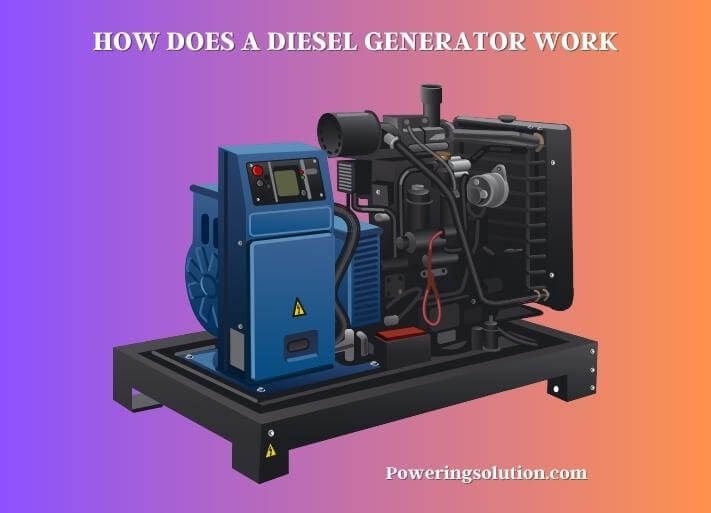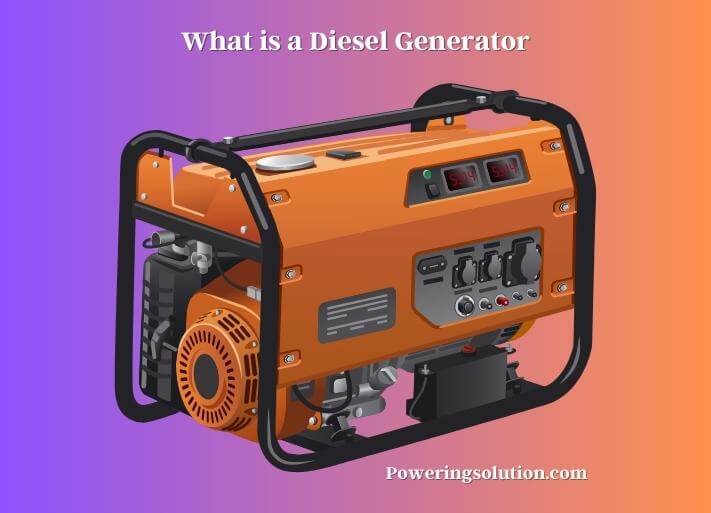Power outages can happen unexpectedly, and it’s important to have a backup power solution that can keep your business or household running smoothly. One reliable option is a diesel generator, which can provide long-lasting and efficient power solutions.

Diesel generators are widely used in various industries, including healthcare, telecommunications, construction, and manufacturing, as well as households. They offer many advantages over other types of generators, such as gasoline or propane-powered generators, including fuel efficiency, reliability, and long-lasting lifespan.
Whether you’re considering buying a diesel generator for your business or household, or simply want to learn more about this reliable power source, this article will provide you with all the information you need.
How Does a Diesel Generator Work?
A diesel generator works by converting diesel fuel into mechanical energy, which is then converted into electrical energy. It consists of a diesel engine, an alternator, a fuel tank, and a control panel.

The diesel engine is the heart of the generator, and it works by compressing air in the cylinders, which heats the air and ignites the diesel fuel. This process creates mechanical energy, which is then transferred to the alternator, which converts it into electrical energy.
What is a Diesel Generator?
A diesel generator is a type of backup power source that uses diesel fuel to generate electricity. It consists of an internal combustion engine that runs on diesel fuel, a generator that converts mechanical energy into electrical energy, and a fuel tank that stores diesel fuel.
Diesel generators are widely used in various industries and households as a reliable source of backup power during power outages or in areas without access to the grid. They are known for their fuel efficiency, reliability, and long-lasting lifespan, making them a popular choice for businesses and households that require a continuous power supply.

Diesel generators come in different sizes and power output capacities, ranging from small portable generators that can power a few appliances to large industrial generators that can power entire buildings or communities. They can also be designed for specific applications, such as marine or military use, or as standby generators for hospitals and data centers.
Advantages of Diesel Generators
Diesel generators offer many advantages over other types of backup power solutions, including:
Cost-effective
Diesel fuel is less expensive than gasoline or propane, which makes diesel generators a cost-effective option for backup power.
Efficient
Diesel generators are more fuel-efficient than gasoline generators, as diesel fuel has a higher energy density.
Long-lasting
Diesel generators have a longer lifespan than gasoline generators, as they have fewer moving parts and require less maintenance.
Reliable
Diesel generators are known for their reliability, as they can operate continuously for long periods without overheating.
Safe
Diesel generators are less flammable than gasoline generators, making them a safer option for indoor use.
Types of Diesel Generators
There are three types of diesel generators, based on their power output:
Standby Generators
Standby generators are designed to provide backup power during a power outage. They are usually connected to an automatic transfer switch that detects when the power goes out and automatically starts the generator.
Prime Generators
Prime generators are designed to provide temporary power for a specific period. They are usually used in construction sites or events where there is no access to the grid.
Portable Generators
Portable generators are designed for outdoor use and are typically used for camping, RVing, or outdoor events.
How to Choose the Right Diesel Generator
Power Requirements
The first step in choosing a diesel generator is to determine your power needs. You can do this by calculating the total wattage of the appliances and devices you want to power during a power outage.
Fuel Tank Size
The size of the fuel tank determines how long the generator can operate without refueling. Choose a generator with a fuel tank that can provide enough power for your needs.
Noise Level
Diesel generators can be noisy, so it’s important to choose a generator with a noise level that is acceptable for your environment.
Brand Reputation
Choose a diesel generator from a reputable brand that has a proven track record of quality and reliability.
Maintenance and Safety Tips
Proper maintenance and safety measures are crucial to ensure the longevity and safety of your diesel generator.
Regular Maintenance
Regular maintenance is essential to keep your diesel generator in top condition and prevent breakdowns. Schedule maintenance checks with a qualified technician to inspect the engine, fuel system, and electrical components. During maintenance checks, the technician will check for signs of wear and tear, replace worn-out parts, and perform routine maintenance tasks such as oil changes, filter replacements, and battery checks.
Fuel Quality
The quality of the diesel fuel you use is crucial to the performance and lifespan of your generator. Use high-quality diesel fuel that meets the recommended standards and keep the fuel tank clean to prevent contaminants from entering the fuel system. It’s also important to monitor the fuel level regularly and refill the tank before it runs out to prevent air from entering the fuel system, which can cause fuel pump damage.
Proper Ventilation
Diesel generators produce carbon monoxide, a poisonous gas that can be deadly if inhaled in high concentrations. Therefore, it’s essential to ensure that the generator is properly ventilated to prevent carbon monoxide poisoning. Install the generator in a well-ventilated area, preferably outdoors or in a dedicated generator room that is properly vented. Make sure that the exhaust pipe is pointing away from doors, windows, and vents to prevent the gas from entering the building.
Grounding
Proper grounding is crucial to prevent electrical shock and protect your generator from lightning strikes. Make sure that the generator is properly grounded according to the manufacturer’s instructions. Use grounding rods or plates that are installed at least six feet deep into the ground, and connect the generator’s grounding wire to the rod or plate.
Storage
Proper storage is essential to protect your generator from damage and ensure its longevity. Store the generator in a dry, cool place and protect it from moisture and dust. Cover the generator with a tarp or other protective cover to prevent damage from sunlight and rain. It’s also important to start the generator periodically and run it for a few minutes to prevent the engine from seizing up and the battery from losing its charge.
Bottom Line
Diesel generators are a reliable and efficient solution for providing power in a variety of settings. Whether you need backup power for your home, a reliable source of electricity for your business, or power for outdoor activities, diesel generators are a cost-effective and long-lasting option.
To ensure the longevity and safety of your diesel generator, it’s important to follow the recommended maintenance and safety guidelines. Regularly checking and changing the oil, fuel filter, and air filter, as well as keeping the generator clean and properly ventilated, can go a long way in preventing malfunctions and prolonging the lifespan of the generator.
With proper maintenance and care, a diesel generator can provide reliable power for many years to come. So if you’re in the market for a power solution that can withstand the test of time, consider investing in a diesel generator.
Common Questions & Response
What Are the Drawbacks of Using a Diesel Generator?
Diesel generators can be noisy, emit fumes, and require regular maintenance. They are also more expensive to purchase compared to gasoline generators, and the initial startup costs can be high.
How Do I Choose the Right Size Diesel Generator for My Needs?
The size of the generator you need depends on your power requirements. Calculate your power needs by determining the total wattage of the appliances and devices you want to power, and choose a generator with a power output capacity that matches or exceeds your requirements.
How Can Energy-Efficient Building Design Impact the Use of Diesel Generators for Power Solutions?
Energy-efficient building design can greatly reduce the reliance on diesel generators for power solutions. An overview of building sustainability can help architects and engineers integrate renewable energy sources and advanced insulation, lighting, and HVAC systems, decreasing the need for backup diesel generators.
Can Diesel Generators Be Used Indoors?
Diesel generators should not be used indoors unless they are properly ventilated to prevent carbon monoxide poisoning. It’s best to install the generator outdoors or in a dedicated generator room that is properly vented.
What is the Lifespan of a Diesel Generator?
A properly maintained diesel generator can last up to 20,000 to 30,000 hours or more, which is equivalent to 10 to 20 years of use. The lifespan of a diesel generator can vary depending on factors such as usage, maintenance, and quality of the generator.
Regular maintenance and proper care can help extend the lifespan of the generator, while neglect and lack of maintenance can significantly reduce its lifespan. It’s important to follow the manufacturer’s recommended maintenance schedule and take necessary precautions to ensure that the generator is functioning safely and efficiently.
